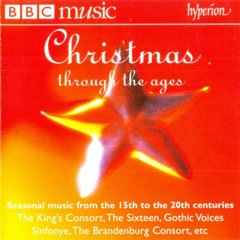Christmas through the ages [2000]
Christmas through the ages [2000]

01 While Shepherds Watched Their Flocks
(John Foster of High Green, Yorkshire)
02 The Sheperds in the Fields (Heinrich Schütz)
03 Procedenti Puero (Anonymous medieval)
04 Riy, Riu Chiu (Spanish traditional)
05 La Luz de Vestros Ojos (Francisco Guerrero)
06 For Unto Us a Child Is Born
from Messiah (Handel)
07 Presto (Giuseppe Valentini)
08 Salvator Noster (Giovanni Gabrieli)
09 There Is No Rose from 'A Ceremony of Carols'
(Britten)
10 Wir Christenleut, BWV 612
from Orgel-Büchlein (Bach)
11 Quem Pastores Laudavere (Michael Praetorius)
12 2. Allegro (Christmas) (Corelli)
13 Omnes de Saba (Orlande de Lassus)
14 The Shepherds Farewell
from L'enfance du Christ (Berlioz)
15 The Three Kings (Peter Cornelius)
16 O Magnum Mysterium (Poulenc)
17 The Coventry Carol
(Traditional, arr. Kenneth Leighton)
18 Noël No 1 (Louis-Claude Daquin)
19 Verbum Patris Umanatur
(Anonymous medieval English)
20 Hodie Nobis (Pedro de Crista)
21 Purie Nostri Concinite (Michael Praetorius)
22 God Is with Us - Christmas Proclamation (John Tavener)
Performer:
A Capella Portuguesa
Matthew Best
Brandenburg Consort
Harry Christophers
Corydon Singers
Alun Francis
Roy Goodman
Gothic Voices
Christopher Herrick
David Hill
Peter Holman
Robert King
King's Consort
Stephen Layton
The Northwest Chamber Orchestra of Seattle
James O'Donnell
Christopher Page
Parley of Instruments
Polyphony
Psalmody
Owen Rees
Christopher Robinson
Sinfonye
The Sixteen
St. George's Chapel Choir, Windsor Castle
Westminster Cathedral Choir
Sioned Williams
Stevie Wishart
Christmas is one of the most important holidays of the year in many parts of the world. It traditionally celebrates Jesus Christ's birth more than 2,000 years ago. But there is a stronger secular, or non-religious, tradition too. For example, family and friends often exchange Christmas cards and gifts. Christmas trees, lights, and Santa are also big parts of the holiday. In fact, through the years, many other customs and cultures have added to the list of traditions that we now associate with the Christmas holiday.
Christmas most likely initially evolved from two much older holidays in the Roman Empire. One of the holidays was called Saturnalia, which celebrated the god Saturn. The other holiday was the Roman New Year. Many of the modern-day traditions come from these festivals, such as giving gifts, merry making, lights, holly, ivy, and charity. The first connection with Jesus, however, comes in the fourth century as a way to promote Christianity in the Roman Empire. Early Christians usually celebrated the birth of Christ with another religious celebration called the Epiphany, which was much less festive.
But it wasn't until the 11th century that Christmas began to grow in popularity. Several kings of England were crowned on this day, and great feasts were regularly held. Although it was a holy day, people commonly drank, danced, and gambled to the point of excess. Perhaps these were holdovers from the older traditions of Rome's Saturnalia, which focused on a week of eating, drinking, and gambling. People in the middle ages exchanged gifts too. However, it wasn't family and friends who exchanged gifts, but instead people with legal relationships.
In the 17th and 18th centuries, Christmas celebrations in America and England almost died out. In America, some religious groups viewed the traditions as immoral. The holiday was made illegal in Boston, for example. In addition, many people connected Christmas with the English, and anti-English sentiment just before and in the years following the Revolutionary War was strong. Many Americans chose not to celebrate the holiday. In England, the holiday became just an excuse to behave immorally, which was far different from the holy celebrations of Jesus's birth.
In the 19th century, though, Christmas adopted much of the tone and sentiment that we see today. Several writers wrote stories of ideal Christmases that focused on compassion, family, and goodwill. In England, A Christmas Carol by Charles Dickens played a major role in reviving and reinventing the holiday. In the US, the writers Washington Irving and Clement Moore Clark published stories that were quite influential too.
Christmas today has mostly become a secular holiday. Although many people go to church to celebrate Jesus's birth, many more people prefer to set up a Christmas tree, exchange gifts with family and friends, watch holiday programs on TV, and eat a roast ham or turkey dinner. In fact, what first comes to mind is based on traditions through the ages, namely trees, presents, and such. --- Chris Cotter, headsupenglish.com
download: uploaded anonfiles yandex 4shared solidfiles mediafire mega filecloudio








